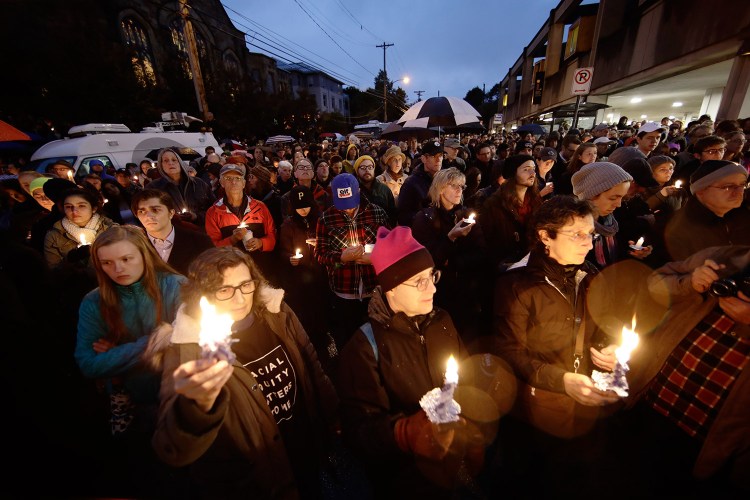BAR HARBOR — Saturday’s horrendous anti-Semitic hate crime at the Tree of Life synagogue in Pittsburgh is deeply saddening and disturbing. It is tempting to think of this as aberration, albeit a deadly one. It is tempting to think that widespread anti-Jewish hate is a thing of the past.
Anti-Semitism, however, has been a serious issue in this country for a long time. Organized hate groups have focused their obsessive anger at Jews and at people of color for several decades. It is not a surprise that Robert Bowers, the suspect in the murders in Pittsburgh, wrote online: “It’s the filthy EVIL jews Bringing the Filthy EVIL Muslims into the Country!!”
Anti-Semitism is present in our communities in Maine and across the country. For nearly 25 years, I have worked in schools to reduce bias, harassment, bullying and violence. The first thing I do when school administrators ask me to help reduce harassment and bullying is to assess the level of bias by conducting focus groups with students. Disturbingly, I have seen anti-Jewish bias increase each year.
Many students hear disgusting “jokes” about Jews and the Holocaust and Jews. “What is the difference between a pizza and a Jew? The pizza does not scream when you put it in the oven.”
Students also hear stereotypes about Jews related to money and dishonesty. Students throw coins in front of Jewish students. If a Jewish student picks up the coins, he or she is targeted as a “money-grabbing Jew.” Students see swastikas drawn or etched on desks and walls. They see classmates give the Nazi salute and say “Sieg Heil.”
I have seen high levels of anti-Jewish bias in schools where there are a significant number of Jewish students. I’ve also seen it in schools where students and administrators do not know of a single Jewish student.
I worry that the students who hear and see anti-Semitic words and conduct have become numb to the destructiveness of anti-Semitism. When they leave school and join the workforce as adults, will they stay silent if anti-Semitism continues to increase?
When we fail to challenge bias and hate, the people who use racist, sexist, anti-LGBT, anti-Muslim and anti-Semitic words misunderstand our silence as approval. Some will escalate to harsher words, harassment and, finally, to violence.
When government leaders condone hate and use degrading stereotypes about minorities, the escalation can occur much faster and with greater violence.
We need to hold President Trump accountable for his words. He has denigrated Mexicans and sent messages that all Muslims are potential terrorists. He has ridiculed black women leaders. He has mocked a disabled reporter. In 2017 in Charlottesville, Virginia, he failed to condemn white supremacists who marched to support the continued admiration of the Confederacy and who carried signs with swastikas and chanted, “Jews will not replace us.”
If we do not challenge the purveyors of bias, division and hate, I fear that the carnage at the Tree of Life synagogue and at the Emanuel African Methodist Episcopal Church in Charleston, South Carolina, where Dylann Roof shot and killed nine black people praying, will continue elsewhere.
It is tempting to believe we cannot change the use of degrading and divisive rhetoric by President Trump and others. But if we don’t try, we likely will continue to hear reports of murders of Jews and black people, and violence against Latinos, Muslims and others.
In Maine, we have a proud history of our elected officials speaking out against divisiveness and bias. Republican Sen. Margaret Chase Smith spoke up in 1950 against dangerous lies and manipulation by Sen. Joseph McCarthy. We hold her memory in honor not because of her party affiliation. We admire her – Republicans, Democrats and independents – decades later because she had the courage to stand up to a man who cynically and cruelly tried to divide the country. She helped bring down a demagogue.
We are not powerless. We all have voices. In our workplaces, in our places of worship and in communications with our elected leaders, we need to use them.
Send questions/comments to the editors.


